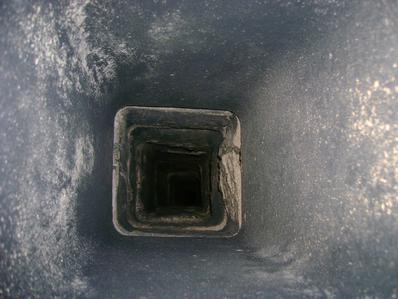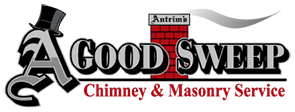
Collapsing Deteriorated oil flue.
Annual Servicing of an Oil Chimney or Oil-Fired Appliance Chimneys
When oil burns it leaves unburned by-products of carbon and sulfur. These are called “oil soot” and if you have a chimney, you are bound to have oil soot and residue on the walls and at the base where they commonly accumulate.
What is the best time of year to schedule your annual servicing?
We recommend calling, after the heating season in the springtime after any sudden frost or cold snap that could occur where you’d need some heat!
Why do I need to service my oil chimney unit?
We use our oil fired appliances throughout the winter where they run on long-running cycles. These long run times produce oil soot that may adhere to the sides of the chimney. The accumulation of soot can fall to the base of a masonry chimney, or directly into the top of the oil-fired appliances, restricting the flow of flue gases. The combustion process produces gases including produces a tasteless, odorless, poisonous gas called carbon monoxide. Carbon monoxide may spill back into the house instead of going up the chimney if appliances are not adequately vented or when the chimney base is not properly swept.
In metal chimneys, the interior lining is constructed of stainless steel, which will not rust but can corrode. Corrosion causes small pinholes to form which will ultimately ruin the integrity of the liner. When these pinholes form, the liner is unable to properly contain the by-products of combustion. Even clay lining in a masonry chimney can flake, or a metal chimney or lining system can corrode. The outcome is the same: they are unable to contain the heat and the flue gases and can create a potential hazard.
Can my oil company service my Appliance Chimney?
A common misconception is that the local oil service company takes care of your chimney. The reality is that oil burner company’s may shovel out the base of a brick chimney and brush out the connector pipes, but more than likely they will not clean the chimney system. An oil burner service technician may tell you that your system is fine without inspecting the chimney at the roof or the interior as well as the exterior masonry, flashing, chimney cap, or other components.
Just as your oil furnace is serviced annually, so should your chimney system be serviced annually by a pro such as Antrim’s, A Good Sweep Chimney & Masonry Service – a CSIA Certified Chimney Sweep.
When your CSIA Certified Chimney Sweep arrives at your home to perform the annual inspection and sweeping of your chimney, you can typically expect to see the following:
• There will be some equipment set-up.
• Steps will be taken to seal off any areas which may allow soot to enter your home
• The pipe connecting the oil furnace to your chimney will be disconnected, swept and reconnected.
• An inspection of the exterior of the chimney will be made.
• The chimney/flue will be swept (if needed), and the interior of the chimney will be inspected to determine its soundness.
• Any loosened soot deposits and flakes will be removed.
• After the service has been completed, the furnace will be restarted for you.
• When your technician has completed the evaluation, he or she will recommend any corrective actions that might be required.

